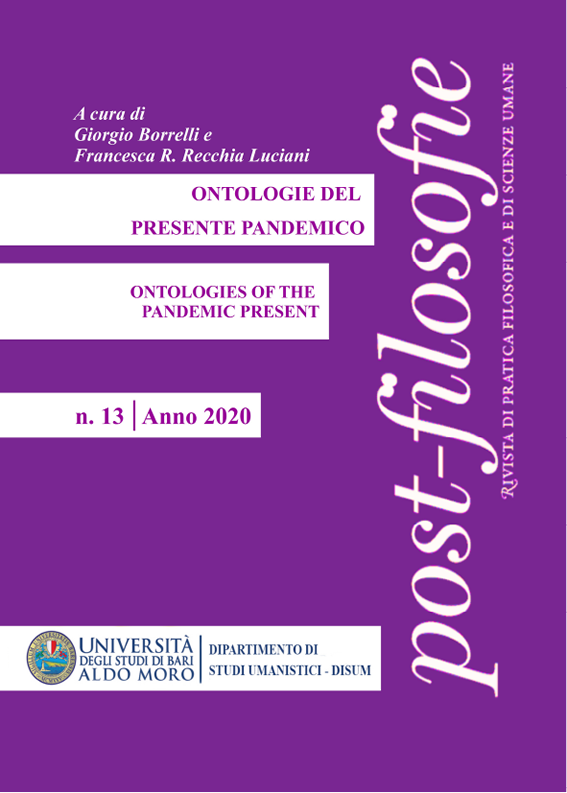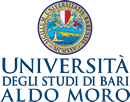Post-neoliberalism in Europe? How economic discourses have changed through COVID-19 pandemic
DOI:
https://doi.org/10.15162/1827-5133/1267Parole chiave:
analisi del discorso e del dispositivo, discorso degli esperti eco-nomici, neoliberismo, politica economica dell’UE, economic expert discourse, EU economic policy, discourse and dispositif analysis, neoliberalismAbstract
La pandemia di COVID-19 sta influenzando le società contemporanee in modi complessi ed eterogenee. Questo lavoro si focalizza sull’economia, analizzando le trasformazioni causate dalla crisi pandemica nei discorsi degli esperti economici europei. Il contributo prende le mosse dalla teoria foucaultiana del dispositivo e distingue quattro livelli attraverso i quali il neoliberismo – sfruttando il sistema UE – ha influenzato le società europee negli ultimi decenni: mondo economico, istituzioni, policy network e discorsi . L’interazione tra i quattro livelli sarà analizzata e discussa a partire dall’analisi empirica del livello discorsivo. Prendendo come casi di studio i Country Report del Semestre Europeo 2020 e le Raccomandazioni UE sull’Italia, verranno individuate tre caratteristiche del discorso neoliberista dell’UE: temporalità discorsiva, autorità discorsiva ed ethos discorsivo. L’analisi discorsiva comparata di due documenti pubblicati tra i mesi di marzo e maggio 2020 mostrerà come lo shock esogeno causato dal Corona Virus abbia drasticamente cambiato il discorso degli esperti economici neoliberisti dell’UE. L’articolo prospetta la nascita di una “nuova normalità” nella sfera politica e politico-economica; un “nuova normalità” che potrebbe influenzare le prospettive future dei Paesi europei.
The COVID-19 pandemic is influencing contemporary societies in complex and multiple ways. This paper focuses on the economy via an analysis of the transformations of European economic expert discourses brought about by the corona crisis in 2020. The contribution starts form Foucault’s theory of dispositif and distinguishes four levels on which neoliberalism was influencing European societies via the EU system in the last decades: the world economy, institutions, policy networks and discourses. While focussing empirically on the discursive level, the interplay of all four levels is discussed and investigated. Taking the example of the European Semester 2020 “Country Reports” and “EU Recommendations” on Italy as case study, three features of these documents characterising EU neoliberal discourse are elaborated: discursive temporality, discursive authority and discursive ethos. A comparative discourse analysis of two documents published between March 2020 and May 2020 shows that corona as external shock has changed EU neoliberal economic expert discourse dramatically. The paper argues that a post-neoliberal “new normality” in the realm of economic policy and politics is emerging that could influence the future outlook of European societies.
Riferimenti bibliografici
ANGERMULLER J., MAINGUENEAU D. AND WODAK R., The Discourse Studies Reader: Main Currents in Theory and Analysis , John Benjamins Publishing Company, Amsterdam 2014.
BIELING, H. J. AND BUHR D., Europäische Welten in Der Krise: Arbeitsbeziehungen Und Wohlfahrtsstaaten Im Vergleich, Campus Verlag, Frankfurt am Main, New York 2015.
BOLDYREV I. AND SVETLOVA E. (eds.), Enacting Dismal Science: New Perspectives on the Performativity of Economics, Palgrave Macmillan, London- New York 2016.
BRAUDEL F., Civilization and Capitalism 15th–18th Century, 1: The Structures of Everyday Life, 2: The Wheels of Commerce. 3: The Perspective of the World. Harper Collins, New York 1985.
BURCHELL G., GORDON C. AND MILLER P. (eds.), The Foucault Effect: Studies in Governmentality, University of Chicago Press, Chicago 1991.
CALLON M., MILLO Y. AND MUNIESA F. (eds.), Market Devices. Malden, Blackwell, Oxford and Carlton 2007.
COSTANTINI O. Political Economy of the Stability and Growth Pact, «European Journal of Economics and Economic Policies: Intervention» (14), 2017, pp. 333–550.
EPSTEIN G. A., Financialization and the World Economy, Edward Elgar Publishing, Cheltenham and Northampton 2005.
EUROPEAN UNION. 2018. Eurostat Regional Yearbook, 2018 Edition. Luxembourg.
FELDER R., From Bretton Woods to Neoliberal Reforms: The International Financial
Institutions and American Power, L. Pantich and M. Konigs (eds.), American empire and the political economy of global finance, Palgrave Macmillan, London 2008, pp. 175–197.
FITZGERALD J. K. AND O’ROURKE B. K., Legitimising Expertise: Analysing the Legitimation Strategies Used by Economics Experts in Broadcast Interviews, in «Journal of Multicultural Discourses» 11(3), 2016, pp. 269–82.
FOUCAULT M., Power/Knowledge: Selected Interviews and Other Writings, 1972-1977, Pantheon, New York 1980.
–, The Birth of Biopolitics. Lectures at the Collége de France, 1978-1979, Palgrave Macmillan, . New York 2008.
HALL P. A. (ed.), The Political Power of Economic Ideas: Keynesianism across Nations, Princeton University Press, Princeton 1989.
–, Varieties of Capitalism and the Euro Crisis, «West European Politics» 37 (6), 2014, pp. 1223–1243.
JÄGER J. AND SPRINGLER E. (eds.), Asymmetric Crisis in Europe and Possible Futures: Critical Political Economy and Post-Keynesian Perspectives, Routledge, London and New York 2015.
JESSOP B., ‘The World Market, Variegated Capitalism, and the Crisis of European Integration’, P. Nousios, H. Overbeek and A. Tsolakis (eds.), Globalisation and European integration: critical approaches to regional order and international relations., Routledge, London-New York2012, pp. 91–111.
KONINGS M., American Finance and Empire in Historical Perspective’, L. Pantich and M. Konings (eds.), American empire and the political economy of global finance, Palgrave Macmillan, London 2009, pp. 48–68.
LEHNDORFF S., Die Spaltende Integration Europas Ein Überblick, S. Lehndorff (ed.), Der Triumph gescheiterter Ideen in Europa – revisited Zehn Länderstudien, VSA, Hamburg 2014, pp. 7–39.
MAESSE J., Economic Experts: A Discursive Political Economy of Economics, in «Journal of Multicultural Discourses» 10 (3), 2015, pp. 279–305.
–, The Discursive Political Economy of Europe: Hybrid Formation of Nationalist Populism through Economics, in «DiscourseNet Collaborative WorkingPaper Series» 3, 2020a.
–, The Euro Crisis Dispositif: Heterogeneous Positioning Strategies in Polycentric Fields, C. Schmidt-Wellenburg and S. Bernhard (eds.), Charting transnational fields: Methodology for a Political Sociology of
Knowledge, Routledge, London 2020b.
MAESSE J. AND NICOLETTA G., Economics as Ideological Discourse Practice: A Gramsci-Foucault-Lacan Approach to Analysing Power/Knowledge Regimes of Subjectivation, in «Journal of Multicultural Discourses» doi: DOI: 10.1080/17447143.2021.1877294, 2021.
MAESSE J., PÜHRINGER S., ROSSIER T. AND BENZ P. (eds.), Power and Influence of Economists: Contributions to the Social Studies of Economics, Routledge, London 2021.
MARTIN R., Financialization of Daily Life, Temple University Press, Philadelphia PA 2002.
MIROWSKI P. AND PLEHWE D., The Road from Mont Pèlerin: The Making of the Neoliberal Thought Collective, With a New Preface, Harvard University Press. Cambridge MA 2015.
MORAVCSIK A., Warum Die Europäische Union Die Exekutive Stärkt: Innenpolitik Und Internationale Kooperation, K. D. Wolf. (ed.), Projekt Europa im Wandel, Baden-Baden 1997, pp. 211–269.
ÖTSCH W. O., PÜHRINGER S. AND HIRTE K., Netzwerke Des Marktes: Ordoliberalismus Als Politische Ökonomie, Springer, Berlin 2017.
PAULI R. C., Boomstädte Und Schrumpfregionen: Das Auseinanderdriften Der Regionen Und Das Versagen Der Regionalpolitik in Der Eurozone. München.
PÜHRINGER S. AND HIRTE K., The Financial Crisis as a Heart Attack: Discourse Profiles of Economists in the Financial Crisis, in «Journal of Language and Politics» 14(4), 2015, pp. 599–625.
STAVRAKAKIS Y., Dispatches from the Greek Lab: Metaphors, Strategies and Debt in the European Crisis, in «Psychoanalysis, Culture & Society» 18(3), 2013, pp. 313–24.
SUM, N-L. AND B. JESSOP, Towards a Cultural Political Economy: Putting Culture in Its Place in Political Economy, Edward Elgar Publishing, Cheltenham 2013.
Downloads
Pubblicato
Fascicolo
Sezione
Licenza
“Post-Filosofie” utilizza Open Journal Systems 2.4.8.5, che è un software open source per la gestione e la pubblicazione di riviste sviluppato, supportato e distribuito gratuitamente dal Public Knowledge Project sotto la GNU General Public License.
Gli autori che pubblicano su questa rivista accettano le seguenti condizioni:
- Gli autori mantengono i diritti sulla loro opera e cedono alla rivista il diritto di prima pubblicazione dell'opera, contemporaneamente licenziata sotto una Licenza Creative Commons - Attribuzione che permette ad altri di condividere l'opera indicando la paternità intellettuale e la prima pubblicazione su questa rivista.
- Gli autori possono aderire ad altri accordi di licenza non esclusiva per la distribuzione della versione dell'opera pubblicata (es. depositarla in un archivio istituzionale o pubblicarla in una monografia), a patto di indicare che la prima pubblicazione è avvenuta su questa rivista.
- Gli autori possono diffondere la loro opera online (es. in repository istituzionali o nel loro sito web) prima e durante il processo di submission, poichè può portare a scambi produttivi e aumentare le citazioni dell'opera pubblicata (Vedi The Effect of Open Access).
"Post-Filosofie" uses Open Journal Systems 2.4.8.5, which is an open source journal management and publication software developed, supported and distributed free of charge by the Public Knowledge Project under the GNU General Public License.
Authors publishing in this journal accept the following conditions:
- Authors retain the rights to their work and assign to the journal the right of first publication of the work, simultaneously licensed under a Creative Commons Licence - Attribution that allows others to share the work indicating intellectual authorship and first publication in this journal.
- Authors may enter into other non-exclusive licensing agreements to distribute the published version of the work (e.g., deposit it in an institutional repository or publish it in a monograph), as long as they indicate that the first publication was in this journal.
- Authors may disseminate their work online (e.g. in institutional repositories or on their website) before and during the submission process, as it may lead to productive exchanges and increase citations of the published work (See The Effect of Open Access).







